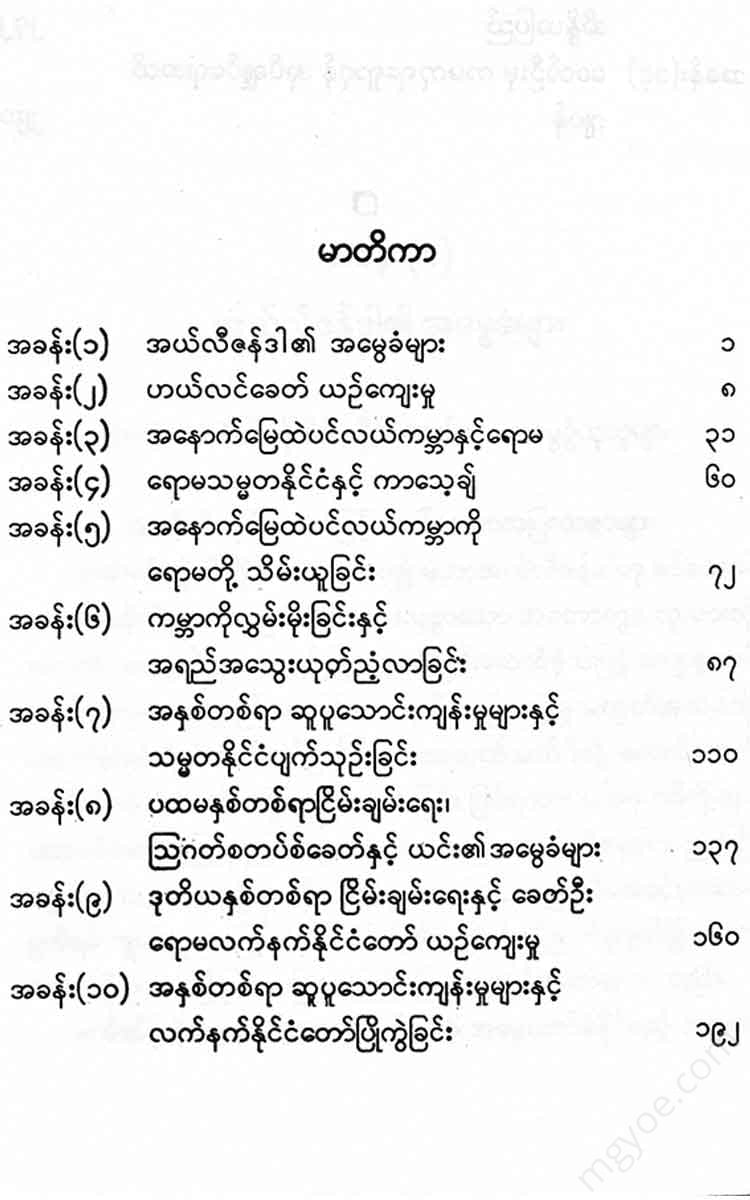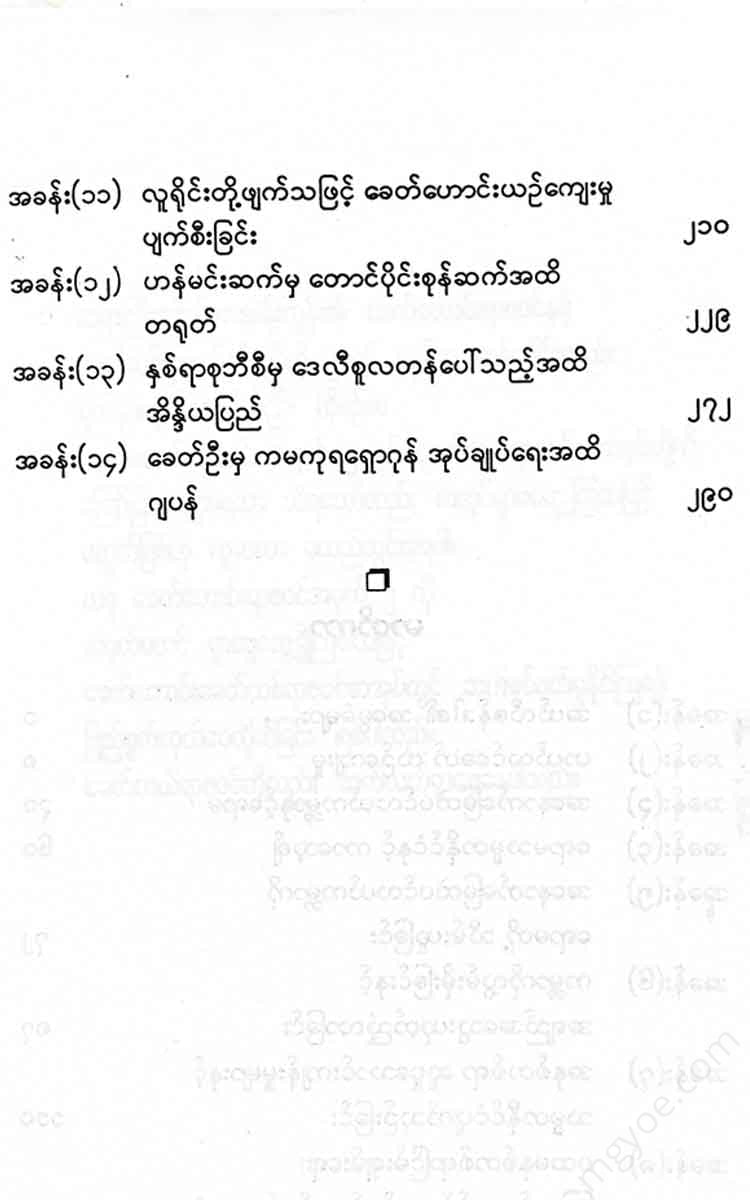စိတ်ကူးချိုချိုစာပေ
Dr. Than Tun - Ancient History (2)
Dr. Than Tun - Ancient History (2)
Couldn't load pickup availability
Alexander is truly worthy of being called the Great Alexander. He accomplished many important things for humanity in his short life, and we must be grateful and praise him. In the past, the Greeks had reached the peak of civilization, and in addition to reaching the peak of politics, Alexander invaded and conquered, but now the Greeks have reached their full potential. Alexander had great plans, but he died before they could be realized, and the unity of the Hellenes was broken, and it did not grow any further, but gradually fell apart.
In Macedonia, Alexander had a half-brother who could have succeeded him. Alexander's wife, Rosana, also had a son. However, Alexander's generals had excluded all of his great-grandsons from the succession.
Sharing among three heirs
In Babylonia, the Macedonian generals who were close to Alexander knew of Alexander's plan for a western campaign, but none of them had the will or the ability to carry it out. They quarreled for years, and the best of the remaining generals was Antigonus. He had hoped to hold Alexander's empire together, but he was killed in battle while trying to suppress the rebellion of his other generals. As a result, Alexander's empire was divided into three parts: one in Europe, one in Asia, and one in Africa. Antigonus II ruled in Europe, while Cassius ruled in Western Asia and Ptolemy ruled in Africa.
Ptolemaic Dynasty of Egypt
In Egypt, the general Ptolemy took the title of king and founded the Ptolemaic dynasty. Ptolemy always relied on Greek mercenaries to maintain his wealth, and he also built a navy to easily recruit Greek soldiers, which later became the most powerful navy in the Mediterranean. He ruled Egypt from Alexandria, the city founded by Alexander the Great on the western bank of the Nile River. The new city became the most beautiful and commercial city in the Mediterranean by the third century BC. He annexed Palestine and southern Syria to protect himself from rivals in Asia.
The rise of the ancient monarchy
The Egyptians, though Greeks, did not have the kind of government that flourished in Greece. They ruled according to the Oriental custom, with the absolute monarchy. They enjoyed the royal power of the ancient pharaohs, and ruled the whole of Egypt according to the ancient system, except for Alexandria and two other cities, which were founded for the Greeks. In the three Greek cities, as in the capitals of Greece, the citizens participated in the administration of the cities. The most important thing in the administration of the Greek kings was to collect as much tax as possible to cover the salaries of the Greek mercenaries and the expenses of the navy. There were no Egyptian coins in Egypt, and Persian coins were used. Ptolemy was the first to mint Egyptian coins. The taxes were paid in money, and The government owned all the banks, and no merchants were allowed to trade in any of the essential goods except the government. Egypt had already had a system of tax collectors, which the Greeks had never had, and Ptolemy continued to use them. This model of reusing the ancient monarchy was soon imitated by the Greeks and Romans in Europe, and democratic rule disappeared from Europe.
The Seyyid dynasty of West Asia
Alexander's empire in western Asia was succeeded by his general Leucippus, and his descendants were called the Seleucids. Although not as powerful as the Ptolemies, they initially extended their influence as far as India. The borders of the Seleucid empire were not clearly defined, and were too vast to be systematically controlled. The Ptolemaic navy dominated the eastern Mediterranean, preventing the Seleucids from making significant progress in trade and maintaining contact with the Greek mainland. However, they founded the city of Antioch to rival Alexandria.
Management of oil markets
In governance, the Seleucids differed greatly from the Ptolemies. They, in keeping with Alexander's policy, encouraged intermarriage, seeking to spread Greek culture in Asia. Seleucus and his son Antiochus I founded new Greek cities in Asia Minor, along the two rivers of Syria, in Persia and India, and gave them self-government in the Greek manner. Thus, the Seleucid Empire consisted of many independent states. However, these states had to pay annual tribute to the Seleucid kings. The king was revered as a god.
Macedonian state of arms
Compared with Egypt and Asia, Macedonia was a very small country. The Greek states were very eager for independence, and it was not easy to maintain them for long. Even after Alexander, many small Greek states rebelled. However, Antigonus II suppressed them and became king of Greece and Macedonia. At this time, a new danger arose in the west and north. The Indo-European tribes, called the Gauls or Gauls, who were still very barbaric, had invaded Europe, and by 400 BC they had reached Italy, and by 200 BC they had entered Macedonia and Greece. In 277 BC, Antigonus II had subdued these barbarians. When the Gauls had cooled down, Antigonus set out to reorganize the state. To counter the Egyptian naval threat, Antigonus II and Antiochus I formed an alliance and raised a navy. They then fought a 15-year war with the Ptolemies, in which Antigonus's fleet defeated the Egyptian fleet twice and the Egyptian navy was destroyed. Once these threats were suppressed, internal rebellions began to break out.
( b) The fall of Greece
Greek trade decline
The Greeks were no longer the leaders in Mediterranean trade as they had been. Trade was dominated by Alexandria and Antioch. Similarly, the Rhodians and Ephesians, instead of the Greeks, became the leading merchants. As a result, the Greeks were no longer as economically prosperous as they had been, and could no longer afford to maintain a navy and mercenary army for defense.
Alliances
For defense, the smaller Greek states formed alliances. As early as 300 BC, the Etomelian League to the north and the Achaean League to the south, separated by the Gulf of Corinth, emerged. A general was elected annually to command the armies of all the member states. In addition, officers were appointed jointly to manage the defense and foreign relations of all the members. Each city was independent in its own local government, but in foreign relations it followed the will of the group. The two groups were not compatible with each other, and although they were able to resist Macedonian rule, they were unable to form a Greek union.
Sparta and Athens
One reason why the Greek League did not form was that Athens and Sparta were not included in the League. The Achaeans tried to force Sparta to join them, but due to the power of the Spartan king Cleomenes, the League was defeated in every battle, and the League was forced to ask for help from Macedonia. When this request was granted, Sparta was destroyed, but the League became subject to Macedonia. Thus, all of Greece, except for the Aetolians, was returned to Macedonia. Athens was granted its own government and was recognized by all the great powers as a neutral state. Athens, although weak in political power, continued to be a leading state in culture.









